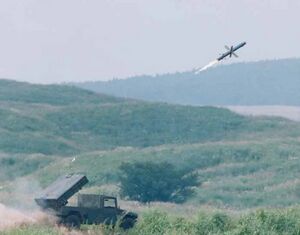GPM-FOGM Killshot: Difference between revisions
Ozycaevias (talk | contribs) m (1 revision imported) |
ContraViper (talk | contribs) No edit summary |
||
| Line 37: | Line 37: | ||
The '''GPM-FOGM Killshot''' is an all-whether, long-range all-purpose missile in service with the [[Inyurstan Army]] and [[Inyurstan Marines]]. Guidance is provided by a microfilament fiber-optic cable which gives the targeting technician an infrared TV screen image of the warheads vision, allowing the user to manually select and steer the missile onto the appropriate target. It can be used against a number of targets, including tanks, artillery, SAM's and other stationary targets or passive assets. | The '''GPM-FOGM Killshot''' is an all-whether, long-range all-purpose missile in service with the [[Inyurstan Army]] and [[Inyurstan Marines]]. Guidance is provided by a microfilament fiber-optic cable which gives the targeting technician an infrared TV screen image of the warheads vision, allowing the user to manually select and steer the missile onto the appropriate target. It can be used against a number of targets, including tanks, artillery, SAM's and other stationary targets or passive assets. | ||
Inyurstan army officers have given the system the unofficial nickname of "The | Inyurstan army officers have given the system the unofficial nickname of "The Major's Sniper Rifle" in reference to it's versatile distance and precision, allowing battalion-level staff to order specific targets to be "picked off" by the system. | ||
===Advantages & Disadvantages === | |||
Advantages of the Killshot system include higher accuracy than mortars and smaller rocket artillery, lighter weight and easier transport than larger missile systems, and man-in-the-loop capacity. These attributes make it an ideal choice for combat in rough terrain, and situations where existing artillery and air forces may be tied down with other targets. It can also be a crucial asset in Inyursta Combatte de Terro-Aere (CTA) doctrine when used to help suppress enemy air defenses by using ground forces. | |||
Disadvantages include cost, time in flight, warhead size and salvo count. A longer time-in-flight leaves the launch unit and missile operator exposed to counter-battery fire. The Killshot system is not capable of suppressing large enemy formations due to the time required for missile flight and reloading, as well as having a smaller warhead which limits explosive and fragmentation "splash damage". For these reasons, it is not a replacement for mortars or short-range rocket artillery. | |||
[[Category: Inyurstan Military Equipment]] | [[Category: Inyurstan Military Equipment]] | ||
Revision as of 13:37, 28 January 2022
| GPM-FOGM Killshot | |
|---|---|
M-2VA launches a GPM-FOGM | |
| Type | Multipurpose Wire-Guided Missile |
| Place of origin | |
| Service history | |
| In service | 2010–present |
| Used by | |
| Production history | |
| Designer | Morales-Sevalière Design Bureau (MSDB) |
| Designed | 2004 |
| Manufacturer | Seratto Defense Solutions |
| Produced | 2008–present |
| Specifications | |
Detonation mechanism | Impact |
| Blast yield | 10kg Explosively Formed Penetrator |
| Engine | Turbofan Motor |
| Propellant | Solid Propellant |
Operational range | 40-60km |
| Speed | 205m/s |
Guidance system | Wire-Guided Fiber-Optic |
| Accuracy | <1m CEP |
The GPM-FOGM Killshot is an all-whether, long-range all-purpose missile in service with the Inyurstan Army and Inyurstan Marines. Guidance is provided by a microfilament fiber-optic cable which gives the targeting technician an infrared TV screen image of the warheads vision, allowing the user to manually select and steer the missile onto the appropriate target. It can be used against a number of targets, including tanks, artillery, SAM's and other stationary targets or passive assets.
Inyurstan army officers have given the system the unofficial nickname of "The Major's Sniper Rifle" in reference to it's versatile distance and precision, allowing battalion-level staff to order specific targets to be "picked off" by the system.
Advantages & Disadvantages
Advantages of the Killshot system include higher accuracy than mortars and smaller rocket artillery, lighter weight and easier transport than larger missile systems, and man-in-the-loop capacity. These attributes make it an ideal choice for combat in rough terrain, and situations where existing artillery and air forces may be tied down with other targets. It can also be a crucial asset in Inyursta Combatte de Terro-Aere (CTA) doctrine when used to help suppress enemy air defenses by using ground forces.
Disadvantages include cost, time in flight, warhead size and salvo count. A longer time-in-flight leaves the launch unit and missile operator exposed to counter-battery fire. The Killshot system is not capable of suppressing large enemy formations due to the time required for missile flight and reloading, as well as having a smaller warhead which limits explosive and fragmentation "splash damage". For these reasons, it is not a replacement for mortars or short-range rocket artillery.
